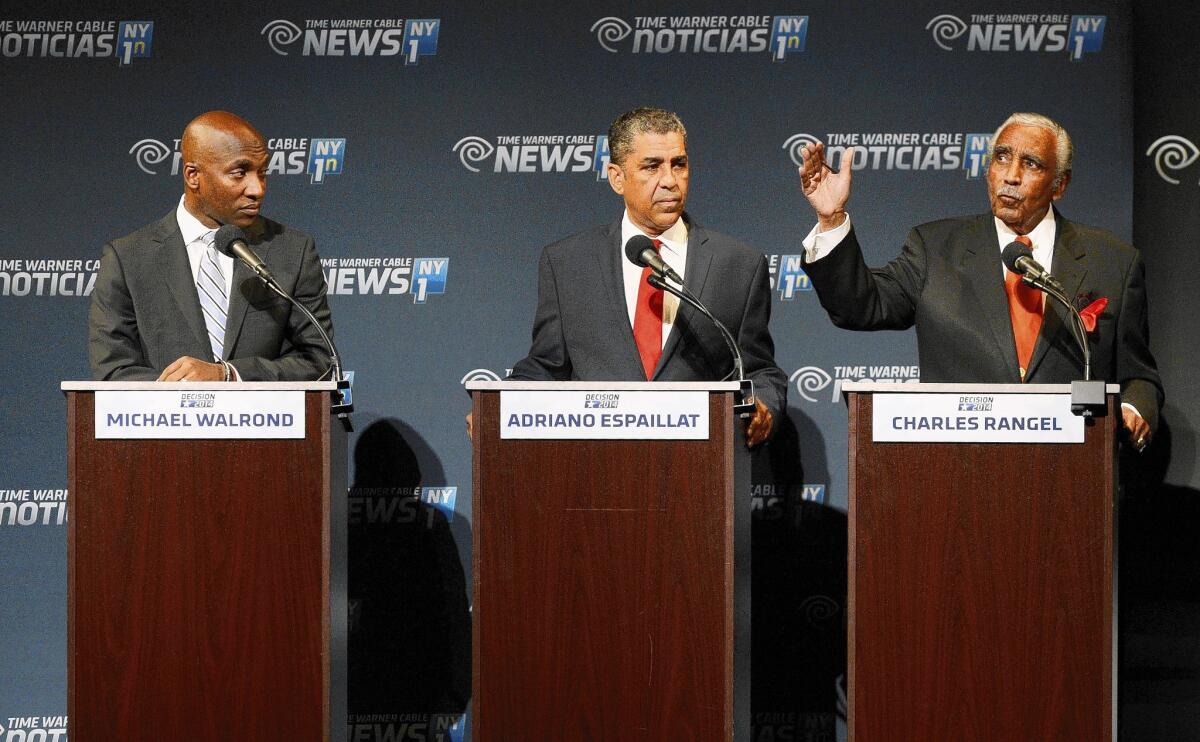Rep. Charles Rangel, 84, tries humor to fend off younger challengers

- Share via
Reporting from NEW YORK — It was Rep. Charles Rangel’s turn to speak in a debate against two rivals hoping to end the New York Democrat’s 44-year congressional career. Instead of addressing the audience, though, the 84-year-old Rangel casually picked up his phone, pretended to take a call and mocked his opponents in a folksy, conversational voice as they sat seething beside him.
It was classic Rangel, using humor and hubris while trying to undermine his much younger and less experienced challengers: State Sen. Adriano Espaillat, 59, and the Rev. Michael Walrond Jr., 41, a Harlem pastor. But the audience laughter that Rangel drew for his make-believe phone chat may not translate to voter support, which Rangel sorely needs if he is to overcome threats in Tuesday’s primary.
In a double dose of bad news for Rangel this week, the New York Times on Thursday endorsed Espaillat, who ran against Rangel in 2012; and Mayor Bill de Blasio pointedly refused to endorse anyone, denying Rangel the powerful mayoral nod that he had enjoyed under former Mayor Michael R. Bloomberg.
Polls show Rangel, who was first elected when Richard Nixon was president, leading Espaillat by several percentage points. Both men poll far ahead of Walrond and a fourth candidate, activist Yolanda Garcia, 64, whose campaign has been barely visible.
But Rangel beat Espaillat in 2012 by just over 1,000 votes, and Espaillat has had time to learn from that defeat. In addition, the example this month of Republican Rep. Eric Cantor — beaten by tea party candidate Dave Brat in Virginia despite polls showing him far ahead — underscored the folly of relying on surveys, political analysts say.
“I think anyone who says they know what’s going to happen in this race — they’re kidding you,” said Jeanne Zaino, who teaches political science and campaign management at New York University and Iona College. “It’s a complicated race. Espaillat got very close last time, and I think he has even more energy and support this time.”
Zaino said the problems facing the incumbent included Rangel’s age, his district’s shifting demographics, endorsements and lack of endorsements, and Walrond’s potential for siphoning off votes.
Walrond is a powerful speaker who is senior pastor at Harlem’s First Corinthian Baptist Church, and he has impressed pundits with his debate performances. Unlike Espaillat and Rangel, who have sparred over issues of race and ethnicity in a district dominated by Latinos and African Americans, Walrond has focused on what he calls the need for fresh political blood to represent an area that is heavily working-class and poor, but also undergoing broad gentrification.
“People are weary of career politicians,” Walrond said at a recent debate, looking directly at Rangel. He did not mention it, but Rangel in 2010 became the first House member since 1983 to be censured — the most severe discipline short of expulsion — after being found guilty of 11 ethics violations. “We need leaders who understand that to serve people does not mean to carry on business as usual.”
“You cannot discount Walrond’s appeal to younger African American voters,” said Patrick Jenkins, a political strategist who works with a Bronx Democratic group that has endorsed Espaillat, speaking on NY1 TV’s “Inside City Hall” this week. “If Walrond is able to get that demographic he has in his church … to even pay attention to him, I think that could make trouble for Charlie Rangel.”
Along the same lines, some experts have said Garcia could shave votes from Espaillat, as both were born in the Dominican Republic.
If he wins, Espaillat would become the first Dominican American in the House of Representatives. A primary victory in this overwhelmingly Democratic city is tantamount to winning the race. The redrawing of boundaries in the 13th District and the city’s population shifts have given the area a majority of Latino residents. Rangel is a founding member of the Congressional Black Caucus and is in his 22nd term in office.
Just as it was in 2012, race is again a factor, but Rangel has been criticized for using it perhaps too aggressively.
“Just what the heck has he done besides saying he’s a Dominican?” Rangel said of Espaillat during a June 6 debate. “He wants to be the Jackie Robinson of the Dominicans in the Congress, but the fact is, Jackie Robinson was a star before he reached the major leagues. And he’s not a Jackie Robinson.”
Espaillat has cast himself as someone attuned to his district’s residents, and he often speaks of arriving in the United States from the Dominican Republic as a child, an immigrant without papers. “This district was created for the disenfranchised, the little guy, the one that often feels no one is listening to him or her,” he said in a debate. But he said the district “has taken a wrong turn,” a clear stab at Rangel, and that change was needed.
But Rangel’s ethics problems are not as fresh in voters’ minds as they were two years ago and have not figured prominently in the campaign. He still commands loyalty among longtime Harlem residents who are more likely to vote than younger Latinos. In addition, the health problems that had him leaning on a cane in 2012 appear to be gone.
“I would not count Charlie Rangel out by any stretch,” Zaino said. “He’s got more energy than a 20-year-old.”
More to Read
Sign up for Essential California
The most important California stories and recommendations in your inbox every morning.
You may occasionally receive promotional content from the Los Angeles Times.














